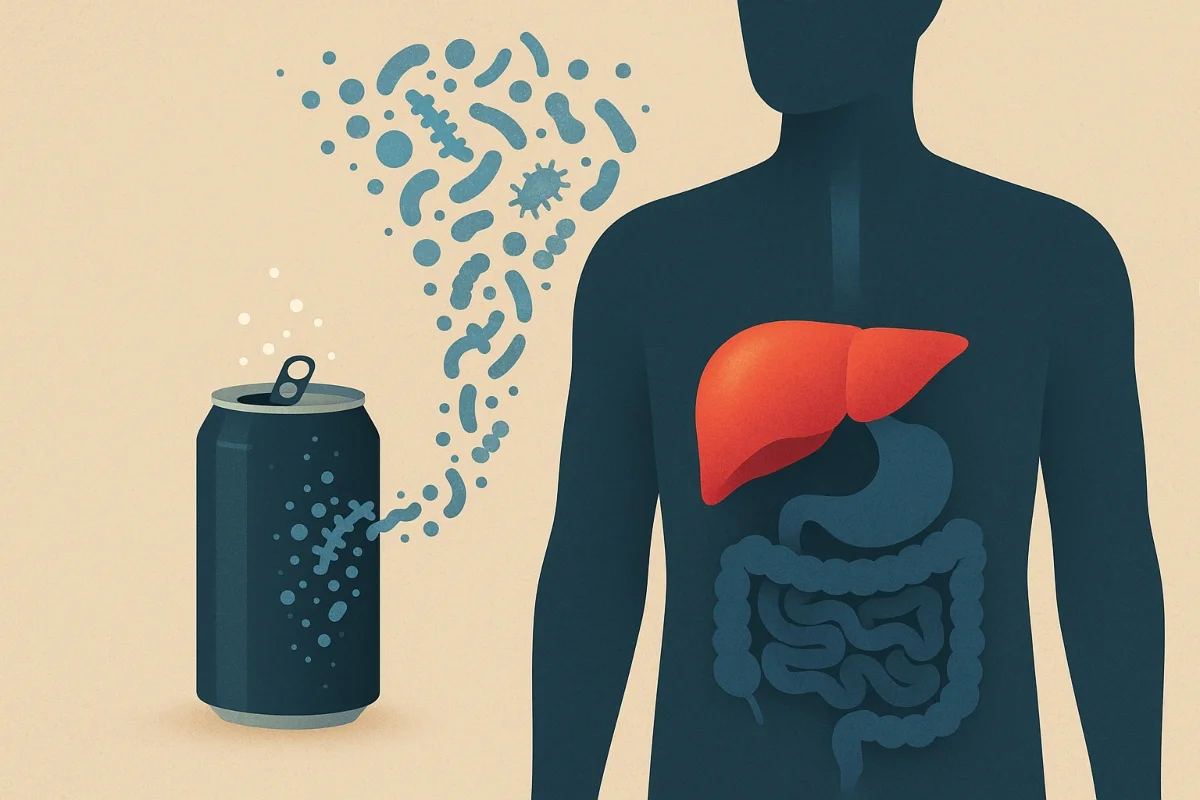Diet sodas promise “zero sugar” and “guilt-free” refreshment—but their artificial sweeteners can disrupt the gut microbiome, which may drive cravings, inflammation, and fat buildup in the liver. If you’re managing or worried about fatty liver, it’s worth asking: is your daily fizzy fix quietly working against you?
The good news: small, consistent changes help. We’ll break down how diet soda can affect gut–liver health and share doctor-backed steps to cut back smartly, rebalance your microbiome, and support liver repair.
What is Fatty Liver Disease?
Fatty liver disease occurs when excess fat builds up in liver cells. It appears in two main forms: alcoholic and non-alcoholic fatty liver disease (NAFLD). Common symptoms include low energy, abdominal discomfort, and bloating. Non-alcoholic cases usually link to diet or lifestyle rather than alcohol intake, making early detection and fatty liver treatment essential.
Expert’s Tips for Fatty Liver Reversal
Dr. Kanwar Bhinder shared five doctor tips for fatty liver, focusing on steady and realistic recovery methods. These steps are now commonly discussed in fatty liver treatment recommendations and liver care routines.
1. Monitor lipid profile: Fatty liver often links to high cholesterol, so lipid-lowering therapy forms a crucial part of fatty liver treatment.
2. Manage diabetes: Fasting sugar should be 126 mg/dL, postprandial below 160 mg/dL, and HbA1c under 7%. GLP agonists are known to help liver reversal.
3. Target healthy weight: If BMI exceeds 26, weight loss through exercise, diet control, or pharmacotherapy is essential.
4. Avoid alcohol completely: Even occasional drinking slows liver recovery and worsens fat buildup.
5. Use medical therapy: Doctor-prescribed pharmacotherapy supports fatty liver reversal by improving liver enzymes and preventing further fat deposition.
These fatty liver reversal tips highlight how small, disciplined lifestyle changes can genuinely turn recovery in your favour.
How Excessive Diet Soda Triggered Fatty Liver Symptoms?
The Indian Express reports that a 27-year-old fitness enthusiast developed grade-2 fatty liver—despite clean eating and no alcohol—after months of fatigue, bloating, and nausea. Doctors traced a likely trigger: frequent diet sodas and energy drinks. Far from harmless, these “zero-sugar” beverages may raise fatty-liver risk; a UB Biobank analysis links drinking just one can a day with a 60% higher chance of metabolic liver disease.
Artificial sweeteners like aspartame trick the brain into expecting calories, spurring hunger and overeating. This leads to excess calorie buildup, promoting liver fat storage. Over time, these sweeteners dull the taste for natural foods, steering people toward processed snacks. This pattern shows how diet soda effects on liver and gut health go far beyond calories, making moderation essential.
What Happens if Fatty Liver Goes Untreated?
Without timely care, fatty liver can progress to NASH, where the liver becomes inflamed. Over time this may lead to fibrosis or cirrhosis, which are difficult to reverse and raise the risk of liver failure and chronic disease.
Spotting early signs and following doctor-led guidance can prevent lasting damage and support recovery. His journey is a reminder that even “healthy” routines can hide quiet risks. Stay alert, stay balanced, and let mindful choices protect your gut and liver.
Disclaimer: This content, including advice, provides general information only. It is not a substitute for a qualified medical opinion in any way. The methods and claims mentioned in this article should be considered as suggestions only; DNP India neither confirms nor denies them. Always consult a doctor before following any such suggestions/treatments/medications/diets.
